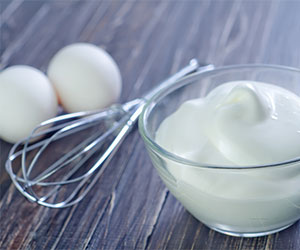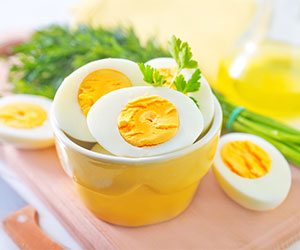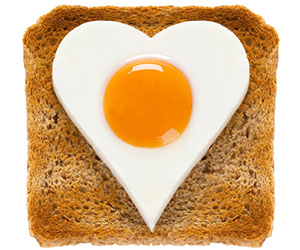The humble egg often gets confusing press. Are eggs good for you or are eggs bad for you? How many eggs should you eat in a week? What about cholesterol? So here are some egg nutrition facts to help you understand the benefits of eating this versatile food.
Egg Nutrition: vitamins and minerals
 An average egg contains around 70 calories which makes it a great low-calorie nutritious addition to any diet. It is packed full of B vitamins which support normal energy production in the body, including B2 (Riboflavin), B5 (Pantothenic Acid) and B12.
An average egg contains around 70 calories which makes it a great low-calorie nutritious addition to any diet. It is packed full of B vitamins which support normal energy production in the body, including B2 (Riboflavin), B5 (Pantothenic Acid) and B12.
Eggs also contain Vitamin D and Phosphorus which support the maintenance of normal bones and teeth. They are a great food to eat during the winter months to keep colds and flu at bay as they contain Vitamin A which alongside Vitamin D and Zinc help support normal immunity.
Zinc also contributes to normal cognitive functioning so you can be an egg-head in more ways than one!
Egg Nutrition: The Egg White
 The white part of the egg or ‘albumen’ is made up primarily of water and contains around 10% protein. Protein is important in the diet as it is one of the body’s building blocks and also acts as fuel, giving you energy.
The white part of the egg or ‘albumen’ is made up primarily of water and contains around 10% protein. Protein is important in the diet as it is one of the body’s building blocks and also acts as fuel, giving you energy.
Some people will have an egg white omelette to benefit from the protein without the fats and associated calories that are mostly found in the egg yolk. However as the yolk contains almost all of the nutrient content of an egg, this is a low calorie but a low nutrient option.
Egg Nutrition: The Egg Yolk
 The egg yolk is made up mostly of fats or ‘lipids’ which also includes the fat-soluble vitamins A and D. Lipids are important in your diet as they store energy in the body but it’s the types of fats that are important to understand and balance in your diet.
The egg yolk is made up mostly of fats or ‘lipids’ which also includes the fat-soluble vitamins A and D. Lipids are important in your diet as they store energy in the body but it’s the types of fats that are important to understand and balance in your diet.
An egg contains three types of fat: saturated, monounsaturated and polyunsaturated. Saturated fat (found in dairy products and meats) should be low in the diet but only makes up around 1/3rd of the total fat found in an egg. The rest is made up of unsaturated fats or ‘essential fatty acids’ and they are just that – essential for the body – which makes an egg a great source of these good fats.
Yolk Fact: did you know that the colour of the yolk depends on the hen’s diet? It can appear more yellow or more orange depending on what the hen is eating!
Egg Nutrition: Cholesterol
 We often think of cholesterol as a bad thing but it is actually needed for many functions of the human body – we just shouldn’t have too much of it. It is the saturated fat in an egg which contains cholesterol. So how many eggs can we eat in a week? There is in fact no limit but as with all diet advice it is about balance. Reducing the amount of saturated fat in your diet at a total level from all sources is the best advice.
We often think of cholesterol as a bad thing but it is actually needed for many functions of the human body – we just shouldn’t have too much of it. It is the saturated fat in an egg which contains cholesterol. So how many eggs can we eat in a week? There is in fact no limit but as with all diet advice it is about balance. Reducing the amount of saturated fat in your diet at a total level from all sources is the best advice.
For more egg facts, recipes and information why not visit Egg Info.
